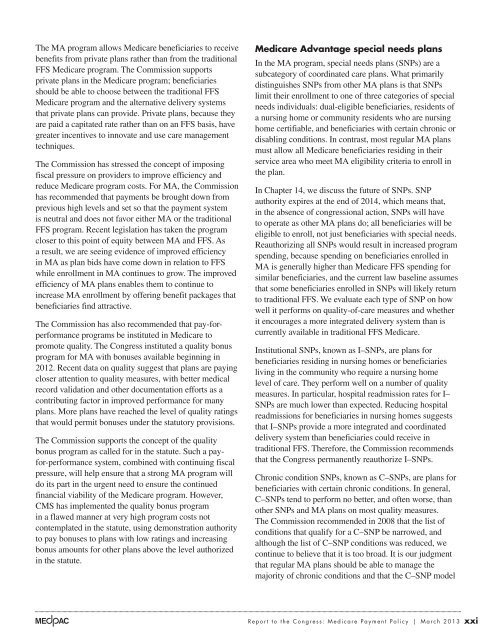Medicare Payment Policy
Medicare Payment Policy
Medicare Payment Policy
Create successful ePaper yourself
Turn your PDF publications into a flip-book with our unique Google optimized e-Paper software.
The MA program allows <strong>Medicare</strong> beneficiaries to receive<br />
benefits from private plans rather than from the traditional<br />
FFS <strong>Medicare</strong> program. The Commission supports<br />
private plans in the <strong>Medicare</strong> program; beneficiaries<br />
should be able to choose between the traditional FFS<br />
<strong>Medicare</strong> program and the alternative delivery systems<br />
that private plans can provide. Private plans, because they<br />
are paid a capitated rate rather than on an FFS basis, have<br />
greater incentives to innovate and use care management<br />
techniques.<br />
The Commission has stressed the concept of imposing<br />
fiscal pressure on providers to improve efficiency and<br />
reduce <strong>Medicare</strong> program costs. For MA, the Commission<br />
has recommended that payments be brought down from<br />
previous high levels and set so that the payment system<br />
is neutral and does not favor either MA or the traditional<br />
FFS program. Recent legislation has taken the program<br />
closer to this point of equity between MA and FFS. As<br />
a result, we are seeing evidence of improved efficiency<br />
in MA as plan bids have come down in relation to FFS<br />
while enrollment in MA continues to grow. The improved<br />
efficiency of MA plans enables them to continue to<br />
increase MA enrollment by offering benefit packages that<br />
beneficiaries find attractive.<br />
The Commission has also recommended that pay-forperformance<br />
programs be instituted in <strong>Medicare</strong> to<br />
promote quality. The Congress instituted a quality bonus<br />
program for MA with bonuses available beginning in<br />
2012. Recent data on quality suggest that plans are paying<br />
closer attention to quality measures, with better medical<br />
record validation and other documentation efforts as a<br />
contributing factor in improved performance for many<br />
plans. More plans have reached the level of quality ratings<br />
that would permit bonuses under the statutory provisions.<br />
The Commission supports the concept of the quality<br />
bonus program as called for in the statute. Such a payfor-performance<br />
system, combined with continuing fiscal<br />
pressure, will help ensure that a strong MA program will<br />
do its part in the urgent need to ensure the continued<br />
financial viability of the <strong>Medicare</strong> program. However,<br />
CMS has implemented the quality bonus program<br />
in a flawed manner at very high program costs not<br />
contemplated in the statute, using demonstration authority<br />
to pay bonuses to plans with low ratings and increasing<br />
bonus amounts for other plans above the level authorized<br />
in the statute.<br />
<strong>Medicare</strong> Advantage special needs plans<br />
In the MA program, special needs plans (SNPs) are a<br />
subcategory of coordinated care plans. What primarily<br />
distinguishes SNPs from other MA plans is that SNPs<br />
limit their enrollment to one of three categories of special<br />
needs individuals: dual-eligible beneficiaries, residents of<br />
a nursing home or community residents who are nursing<br />
home certifiable, and beneficiaries with certain chronic or<br />
disabling conditions. In contrast, most regular MA plans<br />
must allow all <strong>Medicare</strong> beneficiaries residing in their<br />
service area who meet MA eligibility criteria to enroll in<br />
the plan.<br />
In Chapter 14, we discuss the future of SNPs. SNP<br />
authority expires at the end of 2014, which means that,<br />
in the absence of congressional action, SNPs will have<br />
to operate as other MA plans do; all beneficiaries will be<br />
eligible to enroll, not just beneficiaries with special needs.<br />
Reauthorizing all SNPs would result in increased program<br />
spending, because spending on beneficiaries enrolled in<br />
MA is generally higher than <strong>Medicare</strong> FFS spending for<br />
similar beneficiaries, and the current law baseline assumes<br />
that some beneficiaries enrolled in SNPs will likely return<br />
to traditional FFS. We evaluate each type of SNP on how<br />
well it performs on quality-of-care measures and whether<br />
it encourages a more integrated delivery system than is<br />
currently available in traditional FFS <strong>Medicare</strong>.<br />
Institutional SNPs, known as I–SNPs, are plans for<br />
beneficiaries residing in nursing homes or beneficiaries<br />
living in the community who require a nursing home<br />
level of care. They perform well on a number of quality<br />
measures. In particular, hospital readmission rates for I–<br />
SNPs are much lower than expected. Reducing hospital<br />
readmissions for beneficiaries in nursing homes suggests<br />
that I–SNPs provide a more integrated and coordinated<br />
delivery system than beneficiaries could receive in<br />
traditional FFS. Therefore, the Commission recommends<br />
that the Congress permanently reauthorize I–SNPs.<br />
Chronic condition SNPs, known as C–SNPs, are plans for<br />
beneficiaries with certain chronic conditions. In general,<br />
C–SNPs tend to perform no better, and often worse, than<br />
other SNPs and MA plans on most quality measures.<br />
The Commission recommended in 2008 that the list of<br />
conditions that qualify for a C–SNP be narrowed, and<br />
although the list of C–SNP conditions was reduced, we<br />
continue to believe that it is too broad. It is our judgment<br />
that regular MA plans should be able to manage the<br />
majority of chronic conditions and that the C–SNP model<br />
Report to the Congress: <strong>Medicare</strong> <strong>Payment</strong> <strong>Policy</strong> | March 2013<br />
xxi


